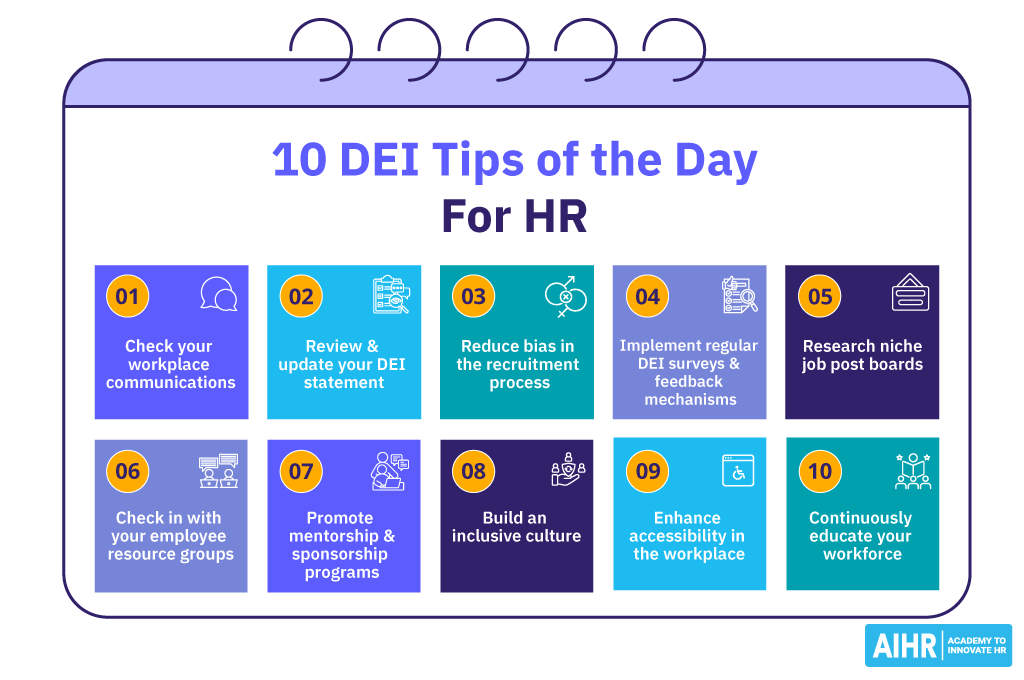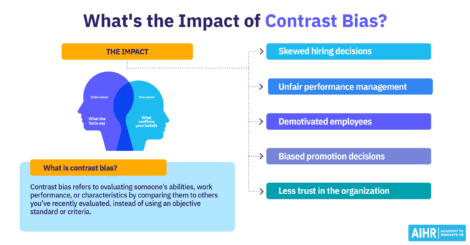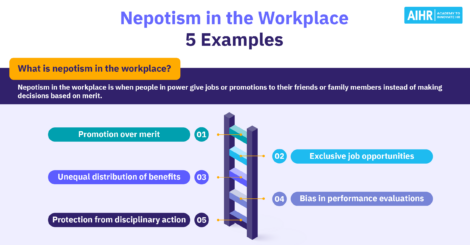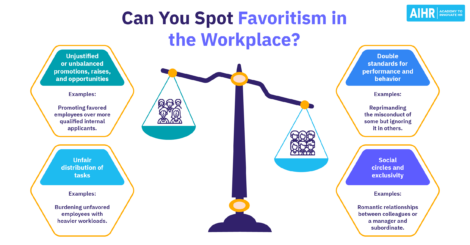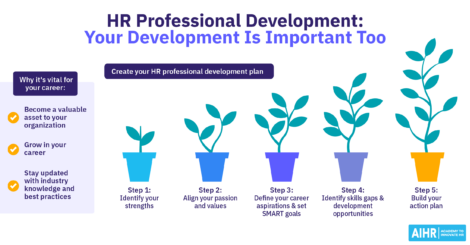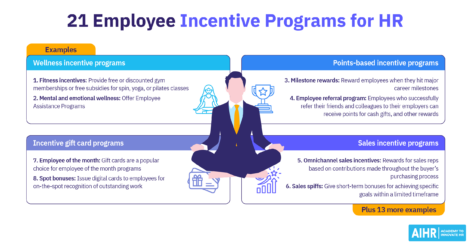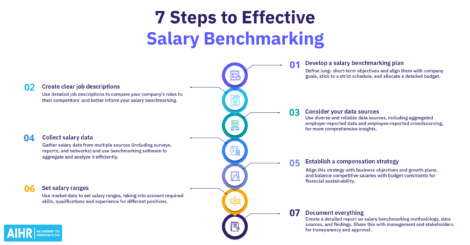10 (Practical) DEI Tips of the Day To Implement in 2024

Introducing the “DEI tip of the day”! It’s a fun and effective way to weave inclusivity into the fabric of your organization and build a more aware, respectful, and inclusive workplace culture.
Although 66% of HR decision-makers believe that greater inclusion of underrepresented minorities would help to attract and retain talent, according to a recent survey of DEIB in the workplace, 61% of employees state they have not received any Diversity, Equity, Inclusion, and Belonging training from their employer. Meanwhile 25% of employees have experienced discrimination at work based on their identity, and 34% have suffered unwelcome comments or conduct.
Regular exposure to DEIB concepts promotes continuous learning and keeps the conversation going, ensuring that DEIB stays at the forefront of everyone’s mind. Small, daily DEIB tips are more digestible and less overwhelming than large training sessions. They allow for gradual, manageable changes in behavior and attitudes.
Contents
The importance of DEIB in the workplace
7 reasons why you need DEIB in the workplace
The current challenges of DEIB
10 practical DEIB tips of the day
The importance of DEIB in the workplace
Employers aiming to attract and retain exceptional talent should prioritize DEIB (Diversity, Equity, Inclusion, and Belonging) initiatives. In fact, when comparing job offers with similar salary and benefits, a significant 95% of employees consider an employer’s DEIB efforts. While, an overwhelming 78% of individuals refuse to work for a company that does not allocate resources to prioritize DEIB initiatives.
Additionally, a remarkable 92% of workers expect company leaders to embrace diversity principles and actively assist all employees in recognizing their biases and fostering inclusivity within the workplace.
According to a recent DDI report, organizations that cultivate a diverse pool of high-potential leaders experience a range of benefits. These include being:
- 11 times more likely to have high-quality leaders overall
- 10 times more likely to have a strong leadership bench
- 4 times more likely to have leaders who understand and respond to evolving customer needs and perspectives
- 3.2 times more likely to attract and retain exceptional talent.
Also, promoting diversity, equity, and inclusion (DEIB) is not solely driven by HR considerations; it also yields significant financial advantages. In fact, organizations with above-average diversity are 2.4 times more likely to outperform their peers financially.
7 reasons why you need DEIB in the workplace
Here are 7 reasons why DEIB is crucial in the workplace:
- Diverse perspectives and innovation: A diverse workforce, encompassing people from different backgrounds, cultures, and experiences, brings a variety of perspectives. This diversity in thought leads to more innovative solutions and ideas, as different viewpoints often challenge the status quo and lead to more creative problem-solving.
- Broader talent pool and attractiveness: Organizations that emphasize DEIB are more likely to attract a broader range of candidates. This is because they are seen as more inclusive and equitable, making them more appealing to individuals from various backgrounds. A commitment to DEIB can also enhance the company’s reputation, making it a more desirable place to work.
- Improved employee engagement and satisfaction: Workplaces that are inclusive and equitable tend to have higher levels of employee engagement and satisfaction. Employees who feel respected and valued for their unique contributions tend to be more engaged in their work and committed to their organization.
- A better understanding of diverse markets: Having a diverse workforce can provide companies with a better understanding of diverse markets. This understanding is vital as it enables them to effectively cater to a wide range of customers. Furthermore, it allows for the development of more effective marketing strategies, innovative product development, and excellent customer service.
- Reduced risk of discrimination and legal issues: Focusing on DEIB can help reduce the risk of discrimination and related legal issues. This is important not only for adhering to legal standard and also for maintaining a positive workplace culture.
- Enhanced decision-making: Diverse groups are often better at decision-making because they can consider a wider range of perspectives and potential outcomes. Studies strongly suggest that diverse teams make better decisions than non-diverse teams up to 87% of the time.
- Global competitiveness: In an ever-globalizing world, fostering a diverse and inclusive workforce can provide a competitive advantage. It enhances communication and comprehension among diverse cultures and geographies.
DEIB is not just a moral imperative but also a strategic one. It leads to a more dynamic, innovative, and competitive organization capable of meeting the challenges of a diverse and changing world.
The current challenges of DEIB
A diverse workplace mirrors society. The current challenges of DEIB in the workplace are multi-faceted and reflect broader economic, social, and organizational dynamics.
- Economic and organizational prioritization: As highlighted by the layoffs of DEIB professionals at companies like Amazon, Twitter, and Lyft, and the overall 19% drop in DEIB job listings during 2022 compared to the previous year, there’s a trend where DEIB initiatives may be deprioritized during economic downturns. This suggests that some organizations may view DEIB efforts as non-essential or secondary to other business functions, particularly in times of financial strain.
- Resistance to change: Implementing effective DEIB strategies often requires significant changes in organizational culture, which can meet with resistance. This resistance can come from various levels within your organization, including leadership, middle management, or general staff, especially if they don’t understand the value or necessity of these changes.
- Tokenism vs. genuine inclusion: There’s a challenge in ensuring that DEIB efforts are substantive rather than symbolic. Tokenism, where superficial actions are taken to appear inclusive without enabling genuine equity and inclusion, can undermine DEIB initiatives and lead to skepticism about their sincerity and effectiveness. Tokenism can also take a toll on mental health, leaving those affected feeling isolated, undervalued, and grappling with imposter syndrome.
- Measurement and accountability: Measuring the impact of DEIB initiatives can be challenging. There’s a need for clear, actionable metrics to assess progress and hold organizations accountable. Without these metrics, it can be difficult to gauge DEIB programs’ effectiveness or justify continued investment in them.
- Intersectionality: Addressing intersectionality – the way different aspects of a person’s identity (like race, gender, class, etc.) intersect and create unique experiences – is complex. DEIB initiatives must recognize and address these nuances to be truly inclusive.
- Sustained commitment: A huge reason DEIB efforts fail is the lack of commitment to the program. DEIB is not a one-time effort but requires ongoing commitment and adaptation. Keeping up the momentum and continuously evolving DEIB strategies to meet changing societal and organizational contexts is a significant challenge.
- Global and cultural differences: Implementing DEIB strategies across different cultures and legal frameworks for multinational corporations can be complex. What works in one country or culture might not be effective or appropriate in another.
- Inclusivity in remote work environments: With the rise of remote work, providing an inclusive environment for all employees, regardless of their physical location, is a new challenge. Ensuring remote workers feel as included and have equal opportunities as those in physical offices is crucial.
These challenges indicate that implementing DEIB initiatives effectively and sustainably remains a complex task that requires dedicated resources, genuine commitment, and nuanced approaches.
10 practical DEIB tips of the day
Here are some practical DEIB tips for HR professionals, each focusing on a specific aspect of workplace diversity, equity, and inclusion:
Day 1: Check your workplace communications
Audit your organization’s written communications, including job postings and internal policies for inclusive language. Ensure that the language used doesn’t unconsciously favor a particular gender, sexual orientation, age, culture, or background. For example, avoid gender-coded words like “aggressive” or “nurturing” in job descriptions and use neutral terms instead.
Day 2: Review and update your DEIB statement
Regularly revisit and update your organization’s DEIB statement to reflect current goals and achievements. Make it concise, clear, and reflective of your commitment. Take inspiration from Adobe’s short, sweet, and spot-on ‘Adobe for All‘. Create a motto that encapsulates your organization’s DEIB ethos in simple, impactful words.
Day 3: Reduce bias in the recruitment process
Develop an interview guide, including interview evaluation forms, for hiring managers that standardizes questions and evaluation criteria to minimize bias. This includes structured interview questions and a scoring system that focuses on the candidate’s skills and experience rather than subjective impressions.
Day 4: Implement regular DEIB surveys and feedback mechanisms
Establish a regular survey and feedback mechanism where employees can anonymously share their experiences and suggestions related to DEIB. This feedback should be reviewed and used to inform DEIB strategies and initiatives.
Day 5: Research niche job post boards
Expand your recruitment reach by posting job openings on niche job boards that cater to underrepresented groups, such as platforms for veterans, women in tech, LGBTQ+ professionals, people with disabilities, and specific ethnic communities. This can help diversify your candidate pool.
Day 6: Check in with your employee resource groups
Regularly engage with Employee Resource Groups (ERGs) to gain insights about experiences and opinions on workplace policies, culture, and DEIB initiatives. Include queries about what’s working well and what could be improved. Use these insights to adjust policies and practices to support diverse employee groups better.
Day 7: Promote mentorship and sponsorship programs
Create and promote mentorship and sponsorship programs within your organization to support the career advancement of underrepresented groups. Make sure that these programs are accessible and customized to meet the needs of diverse participants.
Nielsen’s MyMentor program matches mentors and mentees of all backgrounds across different functions, lines of business, and job grades for increased social connectedness, developmental learning, and culture building.
Day 8: Build an inclusive culture
Encourage and train managers to create an inclusive team culture. This includes recognizing diverse holidays and celebrations, facilitating open discussions about DEIB, and addressing any incidents of exclusion or discrimination promptly and effectively.
Day 9: Enhance accessibility in the workplace
Assess and improve physical and digital accessibility in your workplace. This includes ensuring that office spaces are accessible to people with disabilities incorporating wheelchair-accessible entrances, ergonomic furniture, and adaptive equipment. Digital resources must be usable by everyone, including those with visual or hearing impairments.
Provide screen reader compatibility, subtitles for videos, and alternative text for images to make all employees feel valued and able to contribute fully, regardless of their physical or sensory abilities.
Day 10: Educate your workforce
Implement ongoing DEIB training and education for all employees, including unconscious bias training, cultural competency workshops, and sessions on inclusive communication. Make these trainings regular and mandatory to ensure continuous learning and awareness.
By implementing these tips, you can make significant strides in enhancing DEIB in your workplace, and creating a more inclusive, equitable, and productive organizational culture where everyone feels like they belong.
Key takeaway
To embed inclusivity into the DNA of your organization, look to the “DEI Tip of the Day”. Focusing on DEIB daily will raise awareness and help create a respectful and inclusive workplace culture.
DEIB is both a moral and strategic imperative. A majority of employees consider an employer’s DEIB efforts when choosing between job offers, indicating that DEIB is crucial for attracting and retaining top talent. Organizations with diverse leadership are more likely to have high-quality leaders, understand changing customer needs, and engage and retain top talent.
Organizations with above-average diversity are significantly more likely to outperform their peers financially. These insights indicate that DEIB contributes to a deeper understanding of diverse markets, enhanced decision-making, and global competitiveness, directly impacting an organization’s bottom line.
Weekly update
Stay up-to-date with the latest news, trends, and resources in HR
Learn more
Related articles
Are you ready for the future of HR?
Learn modern and relevant HR skills, online





